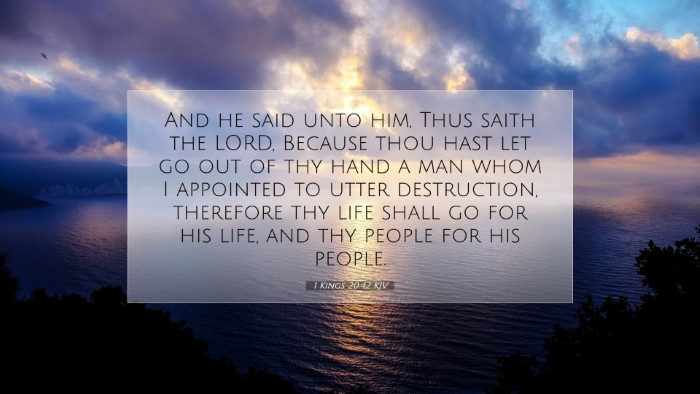Commentary on 1 Kings 20:42
"And he said unto him, Thus saith the LORD, Because thou hast let go out of thy hand a man whom I appointed to utter destruction, therefore thy life shall go for his life, and thy people for his people."
Contextual Overview
The verse is situated within the story of Ahab, the king of Israel, who is confronted by a prophet of God after sparing the life of Ben-Hadad, the king of Aram. This moment is critical as it reveals the tension between human governance and divine sovereignty.
Theological Implications
This verse addresses the themes of divine judgment and the serious consequences of disobedience. For pastors and theologians, it serves as a reminder of God's expectations of leaders and His justice in response to their actions.
Divine Judgment
The first key insight from the commentaries is God's justice. Ahab's failure to carry out God's command resulted in severe repercussions, highlighting that leniency towards God's enemies can lead to dire consequences.
- Matthew Henry: Illustrates how Ahab's mercy towards Ben-Hadad was not an act of kindness but a disregard for God's command. He cites Ahab's subsequent judgment as a necessary act of divine justice.
- Albert Barnes: Emphasizes that God's decree of punishment underscores the seriousness of the covenant relationship. A leader's actions resonate beyond their immediate consequences, affecting their people and future generations.
- Adam Clarke: Points out that the prophecy fulfills a broader narrative of God's sovereignty. Clarke notes that God's appointing of Ben-Hadad for destruction exemplifies God's control over political outcomes.
The Cost of Disobedience
The consequences that Ahab faced illustrate the cost of disregarding God's will. The prophet's warning serves as an admonition for leaders to be discerning and obedient to divine direction.
- Matthew Henry: Comments on the moral implications by noting that Ahab's mercy was rooted in his desire for worldly gain and peace, contradicting God's demands.
- Albert Barnes: Adds that the leader’s integrity is paramount; Ahab's decision spiraled into national consequences that could have been avoided through obedience.
- Adam Clarke: Warns that leniency towards evil can corrupt one's moral compass and result in greater fallout.
Application for Today’s Leaders
Modern pastors and church leaders can learn vital lessons from Ahab's experience. The necessity of adherence to God's commands in leadership is paramount. This narrative invites reflection on the balance of compassion and justice in ministry and governance.
- Leadership Responsibilities: Leaders are accountable, not just to their congregations but also to God. Decisions made with a disregard for God's will can lead to collective consequences.
- Discernment in Decision-Making: There is a call for wisdom and guidance in the face of political and social pressures.
- Understanding God's Sovereignty: Ahab’s story inculcates a deeper realization of God’s sovereignty in our lives and choices.
Conclusion
The warning issued in 1 Kings 20:42 is timeless in its relevance. It challenges contemporary believers to consider the gravity of their decisions and the fidelity of their obedience to God. This passage serves as a poignant reminder that God’s commands must be prioritized, lest we, like Ahab, forfeit our integrity and face severe repercussions.


